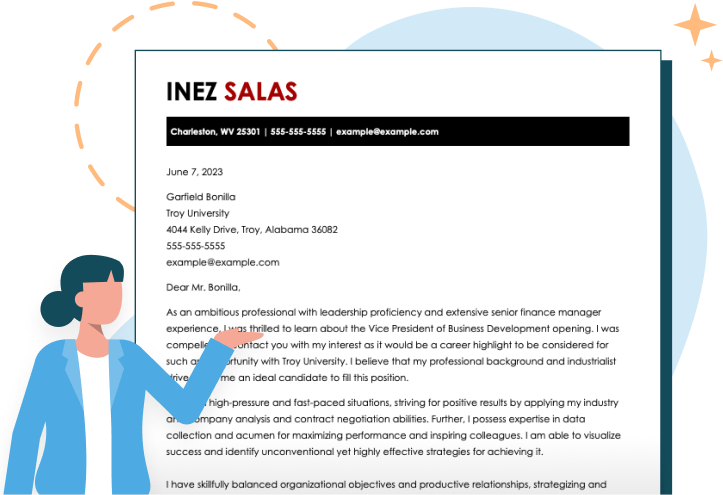- Featured in:
Find More Teaching Cover Letter Examples
Free Assistant Professor cover letter example
Dear Dr. Wilson:
It is with great interest that I am sending my CV to you in response to your posting for an Assistant Professor. As a skilled, research-oriented, and dedicated instructor with a recent Doctorate Degree in Psychology from the University of Michigan, I am prepared to substantially benefit your department in this role.
Preparing lessons, leading class lectures, supervising lab projects, and conducting both independent and peer-based research projects are just a few of the areas in which I excel. By teaching students from a wide range of backgrounds and learning styles I have honed my communication and creativity skills, enabling me to heighten student interest, participation, and motivation. Additionally, I have continually demonstrated a record of research and publishing excellence, including collaborative publications of numerous articles in top-tier academic journals.
Highlights of my qualifications include:
Creating individualized plans and programs to facilitate a targeted, personalized approach to education while stimulating students’enjoyment and appreciation for the subject.
Incorporating college philosophies, regulations, and assessments into lessons while allowing for customizable creativity and flexibility.
Encouraging student participation and progress, meeting with them during and after office hours to ensure optimal subject comprehension and real-world application.
Continually attending professional development seminars to remain abreast of new technologies and alternative delivery methods; integrating tools such as hand-outs, presentations, videos, online activities, and laboratory offerings into classes.
Playing a pivotal role as a key student member of the departmental curriculum review process as a teaching assistant at the University of Michigan.
With my credentials and enthusiasm to teaching excellence, I am well prepared to dedicate myself to the highest standards of instruction at your university and exceed your expectations for this position. I look forward to discussing my qualifications in further detail. Thank you for your consideration.
Sincerely,
Brian S. Messer, PhD
Include These Assistant Professor Skills
- Teaching and research skills
- Organization and planning
- Teamwork and the ability to work independently
- Analytical and critical thinking
- Strong communication and interpersonal skills
- Computer competences
- Administrative skills
- Time management and deadline sensitivity
Teaching Resume Examples



